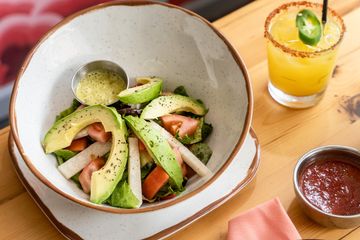Discover the heart of mexican food through regional recipes
Is Mexican Food Healthy And Balanced? Unloading the Nutritional Benefits of Standard Ingredients
The inquiry of whether Mexican food is healthy welcomes an exploration of its typical components. Beans and corn work as foundational staples, abundant in protein and fiber. Avocados supply useful fats, while numerous herbs and flavors add flavor and wellness benefits - freshly made guacamole. With each other, these parts create a tapestry of nourishment. However, the healthiness of Mexican food often depends upon preparation methods and part dimensions. What role do these aspects play in establishing its overall nutritional value?
The Power of Beans: Protein and Fiber-Rich Staples
Although usually neglected, beans function as a foundation of Mexican food, supplying a wealth of nutritional benefits. Rich in healthy protein, they are an exceptional plant-based alternative for those seeking to meet their dietary protein needs. This high protein content supports muscle repair work and growth, making beans vital for both meat-eaters and vegetarians alike. In addition, beans are a remarkable source of nutritional fiber, which assists in food digestion and advertises a sensation of fullness, potentially assisting with weight management.
The variety of beans made use of in Mexican recipes, such as black beans, pinto beans, and kidney beans, adds to a varied flavor profile and can boost dishes nutritionally. Beans are low in fat and include important vitamins and minerals, including folate, magnesium, and iron. With each other, these qualities make beans an important ingredient, supplying both sustenance and food in conventional Mexican fare.

Corn: a Versatile Grain With Nutritional Conveniences
Corn stands apart as a versatile grain essential to Mexican cuisine, celebrated not just for its culinary applications yet likewise for its impressive nutritional account. As a primary component in recipes like tortillas, tamales, and pozole, corn provides necessary nutrients that add to a balanced diet plan. Rich in carbs, it acts as a considerable power resource, while also being low in fat, making it a desirable option for various dietary requirements.
Corn is a good source of dietary fiber, which helps in food digestion and advertises satiation. It includes considerable quantities of vitamins such as B-complex vitamins, which are crucial for basal metabolism. The presence of antioxidants, especially carotenoids, adds to general health and wellness by decreasing oxidative tension. Furthermore, corn is gluten-free, accommodating those with gluten level of sensitivities. Generally, the dietary benefits of corn highlight its importance in standard Mexican food and its duty in a healthy diet regimen.
Avocados: Healthy Fats and Nutrients in Every Bite
Avocados play a significant function in Mexican food, enhancing recipes with their luscious structure and rich flavor. Beyond their culinary allure, avocados are commemorated for their remarkable dietary profile. They are a rich source of healthy and balanced monounsaturated fats, which can aid reduced poor cholesterol levels and assistance heart wellness. In addition, avocados are packed with vital minerals and vitamins, including potassium, vitamin E, and B vitamins, contributing to total health.
The high fiber content in avocados aids food digestion and promotes satiety, making them an advantageous addition to any kind of dish. Their distinct nutrient composition can additionally support skin health and give anti-inflammatory advantages. Integrating avocados into traditional Mexican recipes or appreciating them as a standalone snack can enhance both taste and nutrition, showing why they are a precious staple in Mexican cuisine. In general, avocados offer a scrumptious means to delight in healthy fats and vital nutrients in every bite.

Seasonings and Natural Herbs: Flavorful Health And Wellness Boosters
While taking pleasure in the rich tastes of Mexican food, one can not forget the crucial role that spices and herbs play in improving both preference and health. Components such as cilantro, oregano, and chili peppers not only add to the vivid taste account but also supply substantial wellness advantages. For example, cilantro is known for its cleansing properties, helping to eliminate heavy metals from the body, while oregano is loaded with anti-oxidants and possesses anti-inflammatory impacts.
Chili peppers, a staple in several Mexican recipes, contain capsaicin, which has been connected to boosted metabolism and pain relief. Furthermore, flavors like cumin and coriander support food digestion and may assist in blood sugar level policy. Incorporating these tasty health boosters into dishes not just enhances the culinary experience but also promotes general well-being, making Mexican cuisine not just tasty, however also nutritionally yummy sushi helpful.
Typical Cooking Methods: Enhancing Nourishment and Taste
Conventional cooking approaches in Mexican food play a crucial duty in improving both nutrition and taste, as they usually prioritize fresh components and time-honored methods. Techniques such as nixtamalization, where corn is saturated and prepared in an alkaline service, not just enhance the nutrient profile of tortillas however also enhance their digestibility - freshly made guacamole. In addition, the use of slow-moving food preparation techniques, like cooking or braising, enables tastes to combine beautifully while maintaining the integrity of the components

Often Asked Concerns
Are Mexican Food Portions Generally Larger Than Other Foods?
Mexican food parts are frequently bigger than those of several other cuisines. This particular shows traditional eating methods, emphasizing public sharing and hearty meals, which can lead to a much more substantial offering size on the whole.
Exactly how Does the Preparation Technique Affect Healthiness of Mexican Food?
Prep work methods significantly affect the healthfulness of Mexican food. Techniques such as cooking or steaming protect nutrients, while frying can boost undesirable fat material. Choices of ingredients and cooking styles ultimately figure out total dietary value.
Can Mexican Food Be Customized for Details Nutritional Constraints?
Mexican food can certainly be customized for certain nutritional limitations. Substitutions, such as using corn tortillas for gluten-free diet plans or including more vegetables, make it possible for individuals to take pleasure in traditional flavors while fitting numerous nutritional requirements.
What Are Usual Misunderstandings Regarding Mexican Food and Wellness?
Common misunderstandings concerning Mexican food consist of the belief that it is inherently undesirable, excessively zesty, and only focused on fats. In truth, standard recipes often feature nutritious components and can be tailored to different nutritional requirements.
Exist Much Healthier Alternatives at Mexican Dining Establishments?
Much healthier options at Mexican restaurants frequently consist of smoked meats, beans, and fresh vegetables. Selecting meals that emphasize entire ingredients and preventing heavy sauces can result in a much more healthy dining experience, promoting general well-being.
The variety of beans used in Mexican dishes, such as black beans, pinto beans, and kidney beans, contributes to a varied taste account and can improve meals nutritionally. Avocados play a considerable role in Mexican cuisine, complementing recipes with their luscious appearance and abundant flavor. Incorporating avocados into typical Mexican recipes or pancakes near me appreciating them as a standalone snack can improve both flavor and nutrition, showing why they are a precious staple in Mexican cuisine. While taking pleasure in the rich flavors of Mexican food, one can not ignore the vital function that spices and herbs play in boosting both taste and health. Traditional food preparation techniques in Mexican cuisine play an essential duty in improving both nutrition and taste, as they typically prioritize fresh active ingredients and classic techniques.